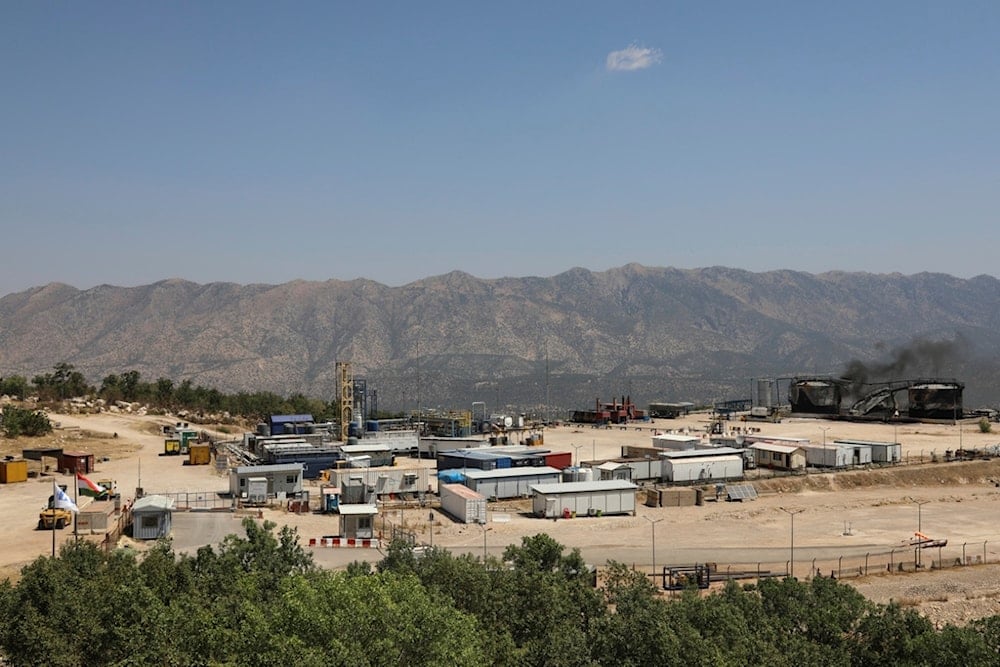Iraq works to keep West Qurna-2 field running amid US sanctions
Sudani meets former Lukoil CEO to resolve sanctions-related obstacles as Iraq seeks to maintain output from West Qurna-2, a field producing 480,000 barrels daily.
-

Black smoke rises from damaged oil storage tanks following drone attacks on an oil field in the Sarsang district of Iraq's semi-autonomous Kurdish region, Thursday, July 17, 2025 (AP)
Iraqi Prime Minister Mohammed Shia’ al-Sudani met former Lukoil CEO Vagit Alekperov on Monday to discuss solutions to the obstacles facing the Russian energy company’s operations in Iraq following US sanctions imposed last month.
Sudani’s office said the meeting focused on ensuring continuity of work at the West Qurna-2 oil field in southern Iraq, where Lukoil recently declared force majeure due to restrictions stemming from the sanctions. The move marked the most serious disruption to date for the company’s activities in the country.
According to sources cited by Reuters last week, the sanctions fallout threatens to hinder the progress of one of Iraq’s largest producing fields, at a time when US President Donald Trump is pushing to intensify pressure on Russia over the war in Ukraine.
Baghdad stresses commitment to oil market stability
In the statement, Sudani reaffirmed Iraq’s commitment to maintaining stability in the global oil market, noting that West Qurna-2 continues to operate at a production capacity of around 480,000 barrels per day.
The field, Lukoil’s most valuable foreign asset, accounts for nearly 9% of Iraq’s total oil output, making it a critical component of national production and export revenues.
Iraqi officials warned that if the force majeure status remains in place for six months, Lukoil may be forced to halt production entirely and potentially withdraw from the project altogether.
Stable field operations
Field operations currently remain stable, but local officials caution that output could gradually decline if financial constraints are not resolved soon.
Payments due to the company have reportedly been frozen, and allocations of crude designated for its exports have been suspended.
Baghdad is now searching for a mechanism that allows work in the field to continue without violating US sanctions, as it balances energy security concerns with international political pressure.
Lukoil declares force majeure amid sanctions
Lukoil has declared force majeure at Iraq’s massive West Qurna-2 oilfield after Western sanctions on the Russian oil giant complicated its operations, Reuters reported, citing four sources familiar with the matter.
Iraq has suspended all cash and crude payments to Lukoil, three of the sources said, a move that disrupted the company’s revenue flow and created operational challenges at the West Qurna-2 oilfield, ultimately prompting Lukoil to declare force majeure.
Force majeure is a legal concept that allows a party to suspend or be excused from fulfilling contractual obligations when extraordinary events beyond their control, such as natural disasters, wars, pandemics, sanctions, or government actions, make performance impossible or impractical.
Sanctions target Lukoil
In October 2025, the US and the UK imposed new sanctions on Lukoil, citing its continued support of Russia’s oil industry amid the war in Ukraine. The measures include barring access to the US banking system, applying secondary sanctions, and placing restrictions on Lukoil’s international subsidiaries.
As a result, Lukoil’s ability to conduct transactions in US dollars has been severely restricted. Planned asset sales abroad now face greater regulatory scrutiny, particularly from the US Treasury's Office of Foreign Assets Control, while European allies are being pushed to align with the enforcement framework.
These sanctions have placed considerable strain on Lukoil’s global business, disrupting revenue streams and complicating its operational commitments in countries where it maintains long-term energy contracts and infrastructure.

 4 Min Read
4 Min Read










